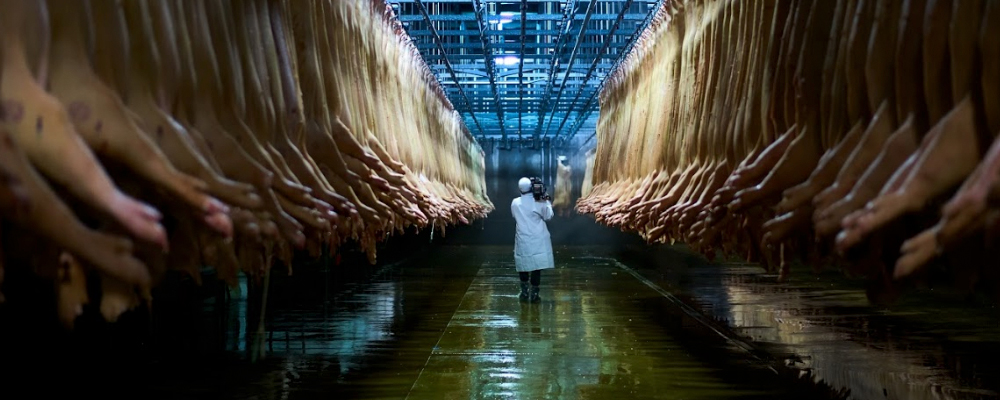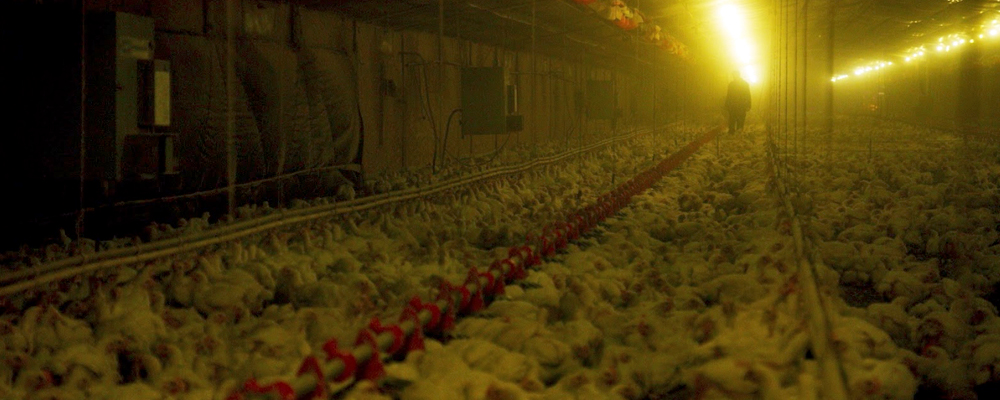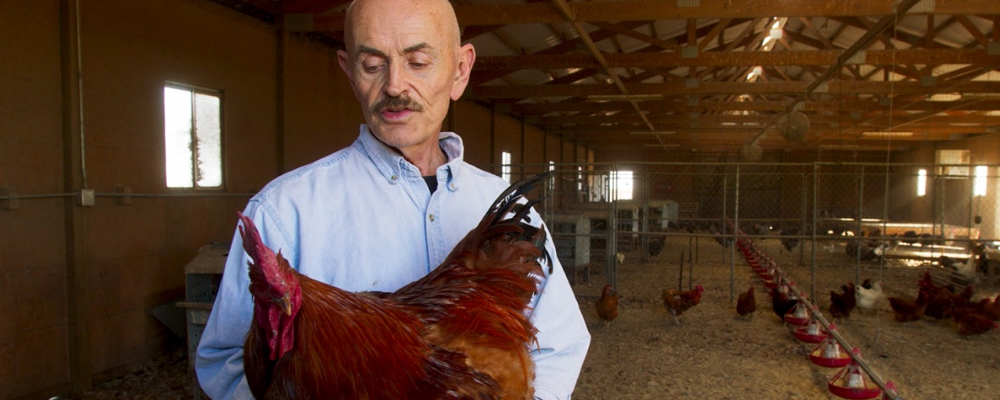‘Eating Animals’ Documents Factory Farming, Animal Suffering, and the Erosion of the Human Spirit
Michael Amundsen
Christopher Quinn’s thoughtful and moving documentary “Eating Animals“ is the result of five years of dedicated work and personal commitment to bring novelist Jonathon Safran Foer’s New York Times non-fiction book of the same name to the big screen. Published in 2009, Foer collaborated with the non-profit organization Farm Forward to examine the role of meat production in our increasingly industrialized world and the toll corporate farming takes on the environment, animal suffering and the human spirit.
An esteemed filmmaker, Quinn’s debut documentary “God Grew Tired of Us” won both the Audience Award and the Grand Jury Prize at the 2006 Sundance Festival. When producers Foer and Oscar-winning actress Natalie Portman (who also narrates the film) went looking for someone to bring the book to the big screen, they came to Quinn. Entertainment Voice recently had the opportunity speak with Quinn about the challenges of turning a popular non-fiction book into a documentary and what it meant to him personally.
“To be honest when Natalie and John first came to me, I didn’t think it was something that was needed to be done. But I read the book anyway and the book blew me out of the water.”
“They were very committed to getting this out whether as a book or a film, giving people a body of evidence so they could start to have a conversation. There is too much at stake environmentally, on our own human and social health and the magnitude of animal suffering that takes place in the system.”
The documentary itself is quiet but devastating in its indictment of the dehumanized manner in which most of our consumer meat product is raised. Quinn avoids the quick editing and the barrage of facts and figures and horrific images that too often plague “message” movies regardless of agenda or political bias. Instead he opts for a deliberate pace to elicit a more considered thought-provoking response from its audience.
As Quinn explained, “We worked especially to create that thoughtful pacing and it required a lot of additional editing time. One had to give room for people to seek on their own and that’s a hard thing to reach in the editorial world, to offer facts and figures and then move on to the next thing. But I knew it was really crucial to offer the space for people to think on their own through the process. Those are the films I like. If you think of Stanley Kubrick’s “2001: A Space Odyssey” where you are going through this environment and you’re able to think on your own. I think that is the power of good cinema. We tried to emulate that.”
According to Quinn, taking hours of footage and condensing it down to an hour and a half is a painful challenge and requires taking the time to do it right.
“We went to India twice. We had these incredible stories in India. But the important thing was to make a film that moved people enough to want to change. And that’s what we kept focused on in the editorial process where you work to shave things away. It’s the artistic piece you want but also you want to move people.”
“We were really lucky to have the time to put together something that communicates in that way. With the advent of VOD and the Internet platforms, it’s getting harder and harder to create films over a long period of time.”
It is a testament to the success of his process that the movie focuses on a handful of stories from different perspectives and never once feels like anything is missing or the film suffers from its time constraints. Every moment presented on the screen is cogent and precise. The right things are said and nothing more. The right images are shown but never exploited, although admittedly those images are often gut-wrenching and horrific. The musical score by Daniel Hart is memorable in its evocative beauty. It supports an almost spiritual element in the film, as does the warm cinematography of Mott Hupfel.
Quinn is quick to credit his collaboration with the film’s editors for the film’s success.
“Geoff Richman is amazing and worked on the handful of documentaries I have done. He worked on the first part but then he had a contractual obligation for another project. So we stopped and went through this long process of finding someone good we wanted to work with. Geoff recommended Mary (Lampson).”
Mary Lampson is a legendary documentary editor whose credits go back to 1976 and the Oscar-winning feature documentary “Harlan County U.S.A.”
“We were lucky Mary decided to edit the project because she is mainly a consultant at this time. She saw an early draft that Geoff had done and she wanted to get on and help finish the film.”
For Quinn, a large part of that process was making sure many different voices were heard. Although the producers themselves are Vegan or Vegetarian, Quinn felt strongly that it was important to hear from farmers who continue to search for ethical means or traditional means to meet the demands of the meat-eating market.
“99% of the meat we eat comes from the factory farm system and then there’s the 1%. It’s necessary to involve the 1% because I think they really matter. Because in my lifetime at least, we are going to continue to eat meat and the 1% deserves a place in the conversation. If we are going to be raising animals for consumption, we should do it in the best way possible. And that’s why I want to highlight the truly independent farmers who are working to try through herculean efforts to keep something alive, a process, that is almost impossible because of the present system.”
When in conclusion Quinn was asked how he would differentiate the book from the film, he was clear.
“The book is a great blueprint, but everyone (meaning the producers) was excited to take it to a new place. What’s difficult to capture in the book is not all the animal suffering. You can get that in print. But there’s something about canvassing America and other parts of the world and staying close to the farmers. You end up seeing there is a real erosion of the human spirit, something I like to think is included in the film whether it’s a contract farmer or it’s someone wrapped up in the factory system or it’s an independent farmer who can’t get his product to market.”
“It’s a lot of human drama that you don’t find in the book. That really separates it (from the book) and makes it its own thing.”
“Eating Animals” opens June 15 in select theaters.



